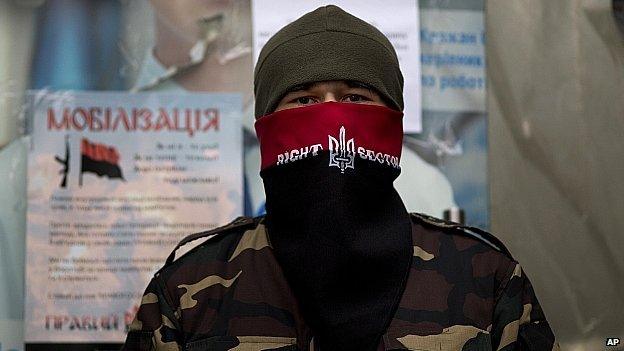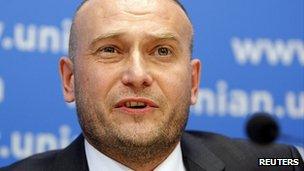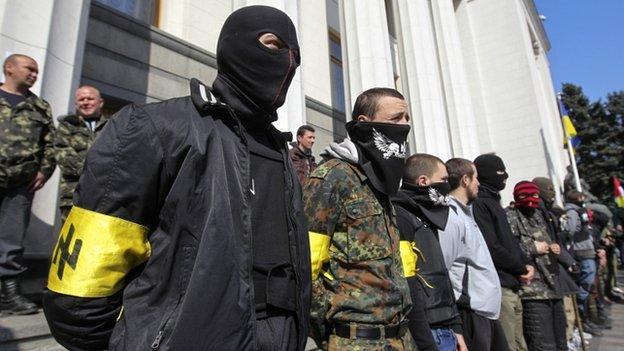Profile: Ukraine's ultra-nationalist Right Sector
- Published

The Right Sector played a leading role in January's violent anti-Yanukovych protests in Kiev
The Right Sector is the most radical wing of Ukraine's Maidan protest movement that toppled President Viktor Yanukovych in February.
Originally set up as an alliance of ultra-nationalist groups in November 2013, the Right Sector is now a party and its leader, Dmytro Yarosh, is running for president in the 25 May election - although his poll rating is negligible.
Critics at home say the party's inflammatory rhetoric and violence is helping Russian media to depict Ukraine as overrun with "neo-Nazis" who threaten the Russian-speaking population.
The Right Sector is trying to portray itself as a responsible party, but enough doubts remain about its attitude and intentions to cause unease in both pro-Kiev and pro-Moscow camps.
Protest role
Activists claiming to be Right Sector members were involved in Kiev's Maidan protests from late November, but the group did not attract much attention until violent clashes with police in central Kiev on 19 January, in which it played a leading role.
By early February Mr Yarosh was saying the Right Sector had 500 fighters on Independence Square and could mobilise up to 5,000 nationwide, although close observers of the protests doubt this.

The Right Sector's leader, Dmytro Yarosh, is running for president
Ideology
A leading figure in the Right Sector, Andriy Tarasenko, says it aims not for closer ties with Europe but rather to "build a nationalist Ukrainian state and stage a nationalist revolution".
Dmytro Yarosh calls himself a follower of Stepan Bandera, a nationalist leader who fought Polish and Soviet rule in the 1930s and 1940s but is seen in Russia and eastern Ukraine as a Nazi collaborator.
Mr Yarosh rejects accusations of racism, saying he regards anyone who fights for Ukraine as a comrade. Right Sector leaders have recently assured the Israeli ambassador that they reject anti-Semitism along with other forms of chauvinism and xenophobia.
Some far-right activists interviewed by the BBC's Gabriel Gatehouse in Kiev in early March made it clear that they wanted a Ukraine "just for Ukrainians".
The nationalist Svoboda party - also a significant player in the Maidan protests - now has three powerful posts in the interim government: acting chief prosecutor, deputy prime minister and chairman of the National Security Council.
Gabriel Gatehouse reports on how much the far right played a part in the unrest in Ukraine
Tensions with authorities
Mr Yarosh is reported to have sought the post of deputy prime minister in charge of security after the fall of President Yanukovych.
Since then relations with the interim government have worsened - especially after a Right Sector leader in western Ukraine, Oleksandr Muzychko, was killed in a police shootout on 25 March.
Supporters demanded the dismissal of Interior Minister Arsen Avakov and even tried to storm parliament on 27 March.
After an apparently drunk Right Sector activist wounded a number of people in central Kiev on 31 March, the group had to quit its city headquarters, leaving weapons behind. Parliament then voted to disarm all paramilitary groups, a move the Right Sector dubbed "untimely" as "war with Russia is under way".

In late March the Right Sector - seen here outside parliament - clashed with the new Kiev authorities
Violence in east
Russia has accused the Right Sector of involvement in violence against pro-Moscow separatists in eastern Ukraine. The Right Sector denies this, but maintains a barrage of anti-Russian rhetoric.
After the separatists seized public buildings in Sloviansk in early April, Dmytro Yarosh urged his followers to mobilise in defence of Ukraine's territorial integrity.
Pro-Russian separatists were quick to accuse the Right Sector of attacking a checkpoint near Sloviansk on 20 April, in which two local people died, alleging that Mr Yarosh's business card was found in a burnt-out car used in the attack. The Right Sector in turn accused Russia of staging the incident.
BBC Monitoring, external reports and analyses news from TV, radio, web and print media around the world. For more reports from BBC Monitoring, click here. You can follow BBC Monitoring on Twitter , externaland Facebook, external.